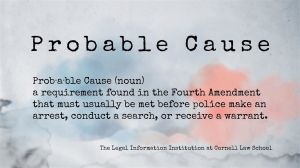
If you believe a person has committed a crime against you, the accused will not necessarily be immediately arrested and charged. Prosecutors and police do not charge and arrest someone solely because another person claims that a crime occurred and wants the suspect charged. Unless the police actually observe the crime, evidence and other information needs to be gathered to recommend that the prosecutor charge the person with a crime.
Unlike what you may have see on TV, the decision to “press charges” doesn’t rest with the victim; it rests with the prosecutor. However, the victim’s willingness to testify and cooperate with police and prosecutors can be crucial in the case against the defendant.
The Path of an Average Arrest
In the average scenario, a victim contacts the police and the police come to the scene or meet with the victim and ask for information. If the suspect is at the scene and the offense just occurred, the police may be able to arrest the person immediately but only if the police have “probable cause”—a reasonable belief that a crime has occurred and the arrestee did it.
If the offender is not at the scene, the police will usually need an arrest warrant, issued by a judge, before they take the person into custody. The police must gather information and evidence and determine whether probable cause exists for an arrest warrant.
In other cases, a victim might file a police report alleging that a crime was committed against them. Similar to the above scenario, the police might need additional evidence to obtain an arrest warrant for the suspect.
HOWEVER, ONCE CHARGED – ONE PERSON’S STATEMENTS ARE ENOUGH TO CONVICT!

Probable Cause
Probable cause means the police believe reasonable grounds exist for concluding that a crime occurred and the accused committed it. The police can consider various types of evidence and information in determining whether probable cause exists to arrest someone, including:
-statements of the victim or witnesses who saw or heard events
-statements of the person accused of committing the crime
-physical evidence, such as a weapon or property damage at the crime scene
-evidence of physical injuries to the victim, and
-video or audiotape of the incident.
This evidence—if sufficient to establish probable cause—will support an arrest or a request for an arrest warrant.
The Role of the Prosecutor
If the police arrest the suspect, the prosecutor will review the police report and determine whether the government can proceed on the charges. The prosecutor must determine whether the government can, with the available evidence, prevail at trial. To win at trial, the prosecutor must prove beyond a reasonable doubt—a standard of proof much higher than probable cause—that the accused committed the crime.
The Role of the Victim
The prosecutor will consider the victim’s statements and expected level of cooperation when determining whether to pursue a case. A victim cannot force or require the prosecutor to pursue a case, but the prosecutor is more likely to pursue criminal charges if the victim is cooperative.
LACK OF COOPERATION DOES NOT ALWAYS MEAN THE CHARGES GO AWAY!

What happens if the prosecutor does not charge the case?
In some cases, a victim might want to pursue criminal charges but the prosecutor may determine a crime was not committed or that not enough evidence exists to prevail at trial, even with the victim’s testimony. While this outcome can be very frustrating for the victim, the victim does not have the authority to make a final decision about prosecution.
What happens if the victim is not cooperative?
A prosecutor can also decide to pursue a case even if the victim asks the police or prosecutor not to. TV and movies sometimes create the impression that the victim decides whether to press charges and, therefore, whether the offender will be subject to criminal prosecution. But this representation isn’t accurate. In a case of domestic violence or assault, for instance, even if the victim does not want to “press charges,” the prosecutor can still decide to proceed without the victim’s cooperation.
Prosecutors can use their subpoena power to force a victim to testify. If the person ignores the subpoena and refuses to testify or does not appear at trial, the judge can issue a bench warrant (like an arrest warrant).
While a prosecutor usually can compel attendance and testimony using a subpoena, the value of a reluctant or hostile witness is debatable. Victims might change or recant their testimony at the last minute and claim to have been mistaken. In any event, putting an angry or hostile witness on the stand can backfire and affect the jury’s belief in the case.
 Proceeding to Trial Without the Victim
Proceeding to Trial Without the Victim
In some cases, the prosecutor can decide to proceed with a trial without the victim’s testimony. Other evidence in the case, such as eyewitness testimony or physical evidence, might be enough to establish the defendant’s guilt. In rare cases, the court will allow the prosecutor to introduce the victim’s earlier, non-sworn statements to the police or others, without having the victim present and subject to cross-examination.
The legal process is complicated whether you are the victim or the accused. If you or someone you love has been charged with a crime contacting a skilled and experienced lawyer as soon as possible is your best bet for a good outcome on the matter. At Jones Law Firm we have decades of experience. Contact us today to set up a free consultation. Please contact us by text or phone at (414) 774-6000 or email at laura@jlfwisconsin.com anytime.
*Any articles in the Libra or posted by Jones Law Firm LLC are not legal advice for a particular client or situation. Further no attorney-client relationship is intended or created with this post.*

